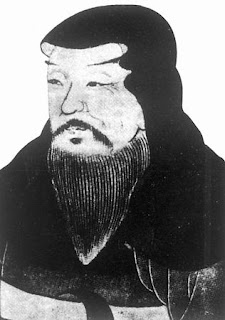Sun c’ - Umenie vojny
Preklad: Mgr. Bc. Vladimír Škultéty
Komentár k prekladu
Pred niekoľkými týždňami som čítal knihu Vladár od Niccola Machiavelliho a spomenul som si, že existuje kniha - Umenie vojny, v čínskej literatúre, ktorá má podobný charakter (hoci napísaná skoro 2000 rokov pred Machiavelliho Vladárom). Našiel som jej text v klasickej čínštine, vytlačil ho a keď som si uvedomil, že má po vytlačení iba jedenásť strán, rozhodol som sa, že ho skúsim zanalyzovať trošku podrobnejšie. Vymklo sa to spod kontroly a skončilo to takto:
Následne mi napadlo, že by som túto knihu, ktorá patrí medzi veľmi dôležité kníhy v histórii čínskej literatúry, preložil do slovenčiny.
V súčasnosti pracujem iba ako tlmočník čínskeho a anglického jazyka, v minulosti som ale pracoval niekoľko rokov aj ako prekladateľ a mám bakalársky titul zo sinológie. Bral som tento preklad aj ako osvieženie starých vedomostí klasickej čínštiny, tréning prekladu samotného a ako poznávací zájazd do Starovekej Číny zároveň.
Pri preklade som si pomáhal dvoma anglickými verziami tejto knihy a po jednom preklade do mandarínskej čínštiny, ruštiny a francúzštiny. Tým, že poznám tieto jazyky relatívne dobre, vrátane klasickej čínštiny, v ktorom bol originál napísaný, sa mi, zdá sa, celkom prekvapivo podarilo skombinovaním všetkých správne preložených problematických častí z rôznych prekladov a mojich vlastných (snáď) správnych vylepšení dospieť k textu, ktorý je miestami možno najpresnejším z tých, ktoré som čítal. Keďže som si pri práci s touto knihou pomáhal s vyššie spomenutými prekladmi do cudzích jazykov, často sa stalo, že čo Američan preložil presne, Francúz poplietol alebo naopak a ja som bol ten, kto to porovnal s originálom a všetko zlepil dokopy.
To samozrejme neznamená, že je moja verzia bezchybná, znamená to len, že ašpiruje na to, aby bola najpresnejšia zo všetkých, s ktorými som pracoval.
Ospravedlňujem sa tiež za chyby a preklepy v slovenčine. Pravopisné chyby, i keď nie vážne, robím pomerne často, kvôli tomu, že po slovensky píšem a hovorím málo a tiež nemám na počítači nainštalovanú kontrolu slovenského pravopisu.
Práca s textom a preklad samotný mi trval asi desať dní, robil som ho vo voľnom čase, a preto hlavne jeho formálna stráknka medzery určite má. Ak by čitatelia našli v texte akékoľvek nepresnosti alebo návrhy ako niečo zlepšiť, budem len rád, ak ich spomenú v komentároch pod týmto článkom. Preklad je len mojim malým dobrovoľným príspevkom k akademickej sinologii a moja vďaka ostatným sinológom, ktorí často zadarmo pracujú na veľkých projektoch ako ctext.org alebo http://tls.uni-hd.de/ ktoré veľmi často využívam. Umenie vojny bolo do slovenčiny preložené aspoň dvakrát, ale jeho text nie je voľne dostupný na internete a vďaka vyššie spomenutému postupu a nepresnostiam ostatných prekladov (na ktorých sú jestvujúce slovenské preklady založené), i keď po formálnej stránke s medzerami, po obsahovej je môj preklad možno snáď o čosi lepší.
Čína je druhou najsilnejšou ekonomikou sveta a či už chceme alebo nie, bolo by dobré ju poznať viac. Ak chceme vedieť, akí Číňania naozaj sú a poznať ich kultúru, musíme v Číne nejakú dobu pobudnúť. Strávil som na Taiwane päť rokov. Po týchto piatich rokoch môžem povedať, že čínsku kultúru chápem, ale len veľmi hmlisto, pričom možno nie so najhorší pozorovateľ. Čínsky svet je podľa mňa jednoducho príliš odlišný od toho nášho, aby sa dal pochopiť čo i piatimi rokmi života v Taipei. Niekoľko osobitostí čínskej kultúry, ktorým som nerozumel, mi ale táto kniha pomohla ozrejmiť a dúfam, že pre ostatných čitateľov bude aspoň zaujímavým rozprávaním. Za všetky citáty v knihe, ktoré sú hodné spomenutia, aspoň jeden:
"Vladár nemôže len na základe svojho hnevu poslať svojich vojakov na nepriateľa a generál nemôže len preto, že sa ho niečo dotklo, ísť do boja. Hýbeme sa, keď je to pre nás výhodné, keď to pre nás výhodné nie je, čakáme. Hnev sa môže zmeniť na radosť a to, že sa nás niečo dotklo sa môže zmeniť na dobrý pocit, ale zničená krajina nemôže opäť povstať a mŕtvi nemôžu opäť ožiť."
Košice, 27.8.2018
Sun c’ - Umenie vojny
Osnovanie plánov
 |
Bambusová verzia knihy Umenie vojny zo zbierky
cisára Čchien Lunga |
Sun c’ povedal: Vojna, je výsostne dôležitou záležitosťou pre štát, cestou prežitia a záhuby a jej zákonitosti musia byť podrobne preskúmané. Pri robení plánov a chápaní jej podstaty, je v najzákladnejšej rovine dôležité brať ohľad na nasledovné: 1. Morálny princíp Tao 2. Nebesá 3. Zem 4. Generálov 5. Systém zákonov Fa.
Pokiaľ ide o morálny princíp Tao, vďaka nemu budú mať vojaci rovnaké ciele ako ich vyšší dôstojníci, budú ochotní za nich zomierať, ochotní pre nich žiť a nebudú sa báť žiadneho nebezpečenstva. Pokiaľ ide o nebesá, tie ovládajú Jin a Jang, chlad a teplo a štyri ročné obdobia. Pokiaľ ide o zem, pri nej rolišujeme to, čo je ďaleké a blízke, nebezpečné a bezpečné, široké a úzke, v čom je život a v čom nie. Pokiaľ ide o generálov, tí môžu byť múdri, dôveryhodní, ľudskí, smelí a prísni. Pokiaľ ide o systém zákonov Fa, ten sa týka organizácie armády, správneho nastavenia systému hodností a kontroly výdavkov.



